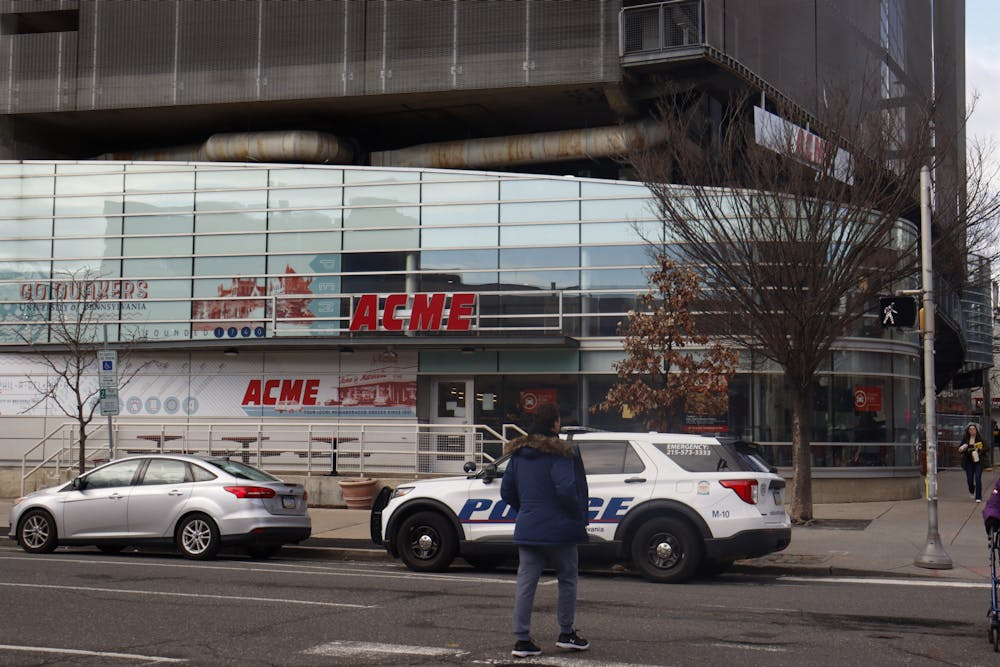From ACME Markets to Trader Joe’s, the hunt for affordable groceries as a college student can be challenging, so The Daily Pennsylvanian analyzed differences in pricing across grocery stores in and around campus.
The DP compared the costs of basic groceries at five grocery stores that lie within one mile of Penn’s campus: ACME Markets, GIANT Heirloom Market, Trader Joe’s, Aldi, and Supremo Food Market. Prices were logged at each store for a set of staple food options in five different categories, and they reflect the store-brand products, or the lowest-cost product if there was not a store-brand option.
The analysis found that GIANT Heirloom Market has the most expensive total cost for groceries.
While Penn offers meal plans for all four years, the institution requires students to enroll in on-campus meal plans for their first two years at the University. However, due to a variety of factors — including dietary restrictions, a desire for more variety, and dissatisfaction with on-campus options — students often opt to find meals elsewhere. Many students choose to make meals on their own, requiring regular grocery shopping.
Jocelyn Gao, a first-year graduate student in the School of Engineering and Applied Science, said that she cooks for herself “pretty often” as there is no graduate student meal plan, and she prefers to do her own cooking.
Gao added that she generally chooses to buy her groceries at certain locations based on convenience or due to a desire for variety. However, she said that knowing more about prices at different locations would “have some impact on [her] choices.”
The grocery list used in the DP's analysis
RELATED:
Heirloom Market near Penn closed for three days due to health code violations
From hot chicken to Southern seafood, University City to welcome three new restaurants
GIANT has highest total cost among grocery stores
The most expensive grocery store within the given set of items is GIANT Heirloom, followed by ACME — the two grocery stores closest to Penn’s campus. Aldi had the lowest costs, followed by Trader Joe’s. Total costs at Aldi are approximately 26% lower than at GIANT Heirloom. Aldi and Trader Joe’s are also the two stores farthest from campus.
Mapping each store around Penn's campus
Epidemiology and nursing professor Karen Glanz pointed to the challenges that undergraduate students face while grocery shopping.
“In general, the undergraduate student population will mostly not have cars, and will have their environment somewhat limited to where they can walk,” Glanz said. “Uber and bus and things like that can help, but shopping is usually a little more challenging.”
Aldi is cheapest in all categories except meat
Despite these overall trends, a grocery store’s average pricing is not always indicative of an individual item’s cost. Although total prices at Aldi are lower than at any other location examined, meat at Aldi is more expensive than at ACME, the second-most expensive store measured.
Additionally, while Trader Joe’s and Supremo are similar in price points, grains are 37% cheaper at Trader Joe’s, while meat and produce are 20% and 36% cheaper at Supremo, respectively.
College junior Hannah Liu said that the differences in cost “make a lot of sense” as a student who has been regularly utilizing the stores for three years.
“What I would spend on a week of groceries [at Trader Joe’s] would be significantly less than what I would spend at Acme for like two days,” Liu said. “I just always pay attention to fluctuating prices.”
Liu added that she tends to prefer grocery delivery services like HelloFresh for convenience. She said that it can be hard to fit in time for groceries, and she finds the options to be at a lower price “than if you were to go out and overspend … since it’s getting you exactly what you need.”
How the prices break down by store for meat, dairy, and eggs
How the prices break down for produce, grains, and canned or jarred goods
Other grocery options include International Foods & Spices, Makkah Market, and Alrayyan Food Market — a cluster of ethnic grocery stores on Walnut Street catering to South Asian, Islamic, and Middle Eastern populations respectively.
These grocery stores were not included in the DP’s analysis because they did not carry some of the staple items analyzed. However, they offer an array of specialty and cultural food items that may not be readily available at more popular options. In some instances, cases of produce or prepackaged items can be cheaper than alternatives. For example, a pound of tomatoes at International Foods and Spices costs $1.99, a full dollar cheaper than at ACME, GIANT Heirloom, and Trader Joe’s.
Both Glanz and Liu said that they value healthier foods, but noted that there is usually a tradeoff in price. Glanz said offering healthy, high-quality foods is not the “top priority” of many stores.
“Quality of food is a really privileged thing to talk about, and if you are able to go the distance and get those groceries at a high-quality place at a higher price, definitely utilize that,” Liu said. “But also recognizing that some of us can’t do that all the time … I think that’s also really important to think about.”
Senior reporter Jin Kwon and staff reporters Anmol Dash and Sina Shaikh contributed to the data collection for this article.









